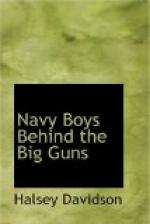Ventilators, life-lines, parts of the superstructure and deck woodwork came down and were stowed in their proper place. Boats dropped from their davits, were hurriedly lashed together, their plugs pulled, and left to sink, riding attached to sea anchors formed of their own spars and oars. “Cleared for action!” when reported to the commander meant exactly that! Not a superfluous object in the way of the activities of a fighting crew.
“Battle stations!”
The four friends from Seacove knew exactly where they were to be all through the battle—if they lived. Whistler knew that he was to stand in the corridor of the handling-room for Turret Number Two, until he was called to relieve some wounded or exhausted member of his gun crew. His immediate order was to “stand by.”
Every other individual aboard the Kennebunk had his station, from the firemen shoveling tons of coal into the fiery maws of the furnaces to keep the indicator needles of the steam-gages at a certain figure, to the range-finders high up in the fighting-tops, bending over their apparatus.
In the turrets the officers fitted telephone receivers to their heads. The gunners, literally “stripped for action” to their waists, their glistening, supple bodies as alert as panthers, crouched over the enormous guns.
Up from the sea appeared the great fighting machines of the enemy. They could not run away this time. Inveigled into range of the Allied ships, the Hun must fight at last!
A word spoken into a telephone from the conning tower to one of the fighting tops! Then, an instant later, to Turret Number One! A roar that shook the ship and seemed to shake the very heavens, while the flash of the fourteen-inch rifle blinded for a second the spectators!
A cheer rose from all parts of the ship, even before the tops signaled a hit. After that the men fought the ship in silence.
Alone in the corridor, Whistler Morgan felt that it would be easier to be on active duty in this time of stress. Yet he had been taught that his station was quite as important as that of any other man or boy aboard.
Through the half open door of the handling room he heard other men loading powder bags and shells upon the electric ammunition hoist that led to the turret above.
Suddenly the whole ship staggered. A deafening explosion, different from that of the guns, shocked him. An enemy shell had burst aboard the Kennebunk!
“Relief!”
Whistler sprang through the corridor and up to the gun deck. Was the call for him?
He stopped to look at a perspiring gun crew. They worked the gun with the precision of automatons. Wherever the shell had burst it had not interfered with the firing of the huge guns of Number Two Turret.
Another enemy shell burst inboard of the Kennebunk. There was a hail of bits of steel and flying wreckage. Whistler stood squarely on his feet and began to breathe again.




